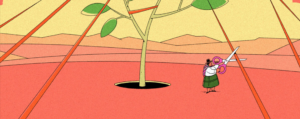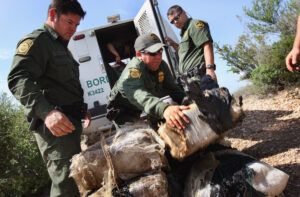John Walsh, the Director for Drug Policy and the Andes at the Washington Office on Latin America (WOLA), delivered the following remarks at the Seventy-Fourth Regular Session of OAS/CICAD on December 12, 2023.
This week marks 75 years since the Universal Declaration of Human Rights, when the world pledged to promote “universal respect for and observance of human rights and fundamental freedoms.”
- The right to life, liberty and security.
- To a standard of living adequate for health and well-being.
- To be free from torture or cruel, inhumane or degrading treatment.
- To not be subjected to arbitrary arrest, detention or exile. To name just a few.
In these 75 years, the world has built significantly on the foundation of the Universal Declaration.
- Among the many milestones: the 2007 UN Declaration on the Rights of Indigenous Peoples.
- And just last year, recognition of the right to a clean, healthy and sustainable environment.
But as we all know, recognizing human rights does lead automatically to respecting, protecting and fulfilling them.
In commemorating the Universal Declaration, we must acknowledge the huge gap between the Declaration’s aspirations and the precarious human rights situation in today’s world.
A full assessment of our human rights shortfalls must include the UN drug control regime—launched with the 1961 Single Convention on Narcotic Drugs, with additional treaties in 1971 and 1988.
The Single Convention aims to protect the “health and welfare of humankind” by ensuring access to essential medicines while eliminating non-medical uses of drugs.
The 1961 treaty largely took shape during the 1950s and was unfortunately rooted in the colonialist attitudes and racial prejudices of that era.
Since the outset, the drug regime’s ethos has been punitive and prohibitionist, leaning on law enforcement to suppress illegal drug supplies and drug use.
The drug treaties scarcely mention human rights.
The 1988 Convention does stipulate that crop eradication measures “shall respect fundamental human rights and shall take due account of traditional licit uses, where there is historic evidence of such use, as well as the protection of the environment.”
But in practice, forced eradication operations—including aerial chemical spraying—have been undertaken for decades in the absence of alternative livelihoods, violating people’s rights to live in dignity and free from hunger, as well as their rights to an adequate standard of living and to a clean and sustainable environment.
So what is the track record, nearly 60 years after the Single Convention came into force?
Simply put, access to essential medicines remains starkly limited and unequal, while illegal drug markets are thriving as never before.
The UN International Narcotics Control Board estimates that “more than 80 per cent of the world’s population … have no access to internationally controlled essential medicines to address serious health-related suffering associated with severe pain, palliative care needs, treatment of substance use disorder, and other conditions.”
This glaring lack of access to essential medicines, according to the UN special rapporteur on the right to health, “challenges human dignity and the basis of all human rights, including the rights to life, health and development of all persons.”
At the same time, illegal drug markets that the treaties have intended to eliminate are in fact flourishing.
The UN’s World Drug Report estimates that nearly 300 million people used illegal drugs worldwide in 2022, a 23 percent increase over the previous decade.
The plain reality is that there has never been a drug-free world, and there never will be.
Banning and criminalizing drugs does not change that fact.
Instead, our collective attempt at prohibition makes drug use more hazardous while generating vast revenues that fuel organized crime and corruption worldwide.
In September, the UN High Commissioner for Human Rights released a landmark report that underscores the failure of punitive drug policies and calls for new approaches based on human rights, including through harm reduction services and decriminalization and legal regulation of drugs.
The severe human rights problems identified by the High Commissioner include:
- Lack of, and unequal access to, treatment and harm reduction
- Militarization of drug control as a driver of state violence
- Application of the death penalty for drug offenses
- Disproportionate drug laws fueling mass incarceration
- Discriminatory targeting of marginalized groups such as Indigenous peoples, people of African descent and women
- Negative impacts on populations caught in humanitarian crises, such as conflict, displacement, pandemics and natural disasters.
In addition to the major problems cataloged in the High Commissioner’s vital new report, the prohibitionist framework that undergirds global drug policies is also aggravating a cascading set of interlocking crises that are besetting the Americas and the world.
Under conditions of prohibition, burgeoning illegal drug markets continuously generate vast financial profits for groups and individuals willing to act outside the law.
These enormous profits exacerbate a range of interconnected problems, including organized crime and corruption, violence and insecurity, displacement and migration, authoritarian politics, and the climate crisis.
A recent Washington Post newspaper article included the matter-of-fact sentence that “Drug cartels and other crime groups have entrenched themselves throughout Latin America.”
Ten or even five years ago, such a statement might have seemed like hyperbole. But not today.
Illegal drug markets are becoming larger and even more profitable, and the power and reach of organized crime is growing apace. Corruption, intimidation and violence—often with the complicity of state actors—dramatically multiply the challenges to human rights.
As described by the Global Initiative Against Transnational Organized Crime, organized crime undermines human rights on multiple fronts, by:
- impairing civil and political rights
- depriving people of their economic, social and cultural rights
- provoking repressive state responses, and
- undermining the right to access to justice, cementing impunity.
Fears over vulnerability to crime can erode confidence in democratic government and increase support for strongman rule that risks overriding checks and balances and dispensing with the rule of law in the name of delivering security.
- In Latin America and the Caribbean, the UN Office on Drugs and Crime attributes about half of homicides with a known typology to organized crime or gang-related activity.
- The 2023 Americas Barometer survey found that satisfaction with democracy in Latin America and the Caribbean is lower now than a decade ago, and that with the exception of only a few countries, the majority of the region’s citizens are dissatisfied with democracy.
- A separate survey, Latinobarometro, shows growing support among citizens for non-democratic governments taking power if they solve problems—a sentiment that has increased steadily from 44 percent in 2002 to 54 percent in 2023.
Widespread corruption and insecurity, punctuated by impunity, add to the causes of displacement and migration—aggravating another huge challenge facing the Americas.
- Americas Barometer found that nearly one third of Latin American and Caribbean citizens express an aspiration to leave their home country.
- The same survey identified food insecurity, crime victimization and natural disasters as the most consistent predictors of desire to leave one’s country.
- Many migrants are further victimized by organized crime groups as they travel to seek safer conditions.
Prohibition and our efforts to enforce it—especially crop eradication and drug interdiction operations—are accelerating the climate crisis, with devastating impacts on Latin America’s tropical rainforests and the Indigenous communities who live in and protect the forests.
- Drug profits act like an investment bank for a host of other environmentally damaging activities and illegal trades.
- The extractive industries lubricated by illegal drug revenues—such as cattle ranching, logging, agriculture, and mining—accelerate forest loss.
- Indigenous communities and other forest defenders face mortal peril as environmental governance erodes to the point of collapse.
Drug prohibition and the “war on drugs” have largely succeeded in one respect—evading the kind of rigorous scrutiny that public policies with such enormous consequences should undergo.
Bureaucratic buy-in, powerful vested interests, drug war propaganda, and fear have generated massive policy inertia.
The prohibition status quo has come to be seen by many as inalterable, a paralysis that insulates the drug regime from systematic social-scientific research, and that inhibits the design of truly evidence-based drug policies.
As we celebrate the 75th anniversary of the Universal Declaration we must also acknowledge the vast challenges still before us.
We must take a cold, hard look at the prohibitionist drug control regime and take the overdue steps required to create drug policies that respect, protect and fulfill human rights.
If we fail the urgent task of reforming our drug policies, the human rights devastation already so obvious today will become even more extreme—untreated suffering from pain, massive violations of human rights, toxic drug markets, rampant corruption and insecurity, democratic erosion, and deepening climate crisis.

 John Walsh
John Walsh


